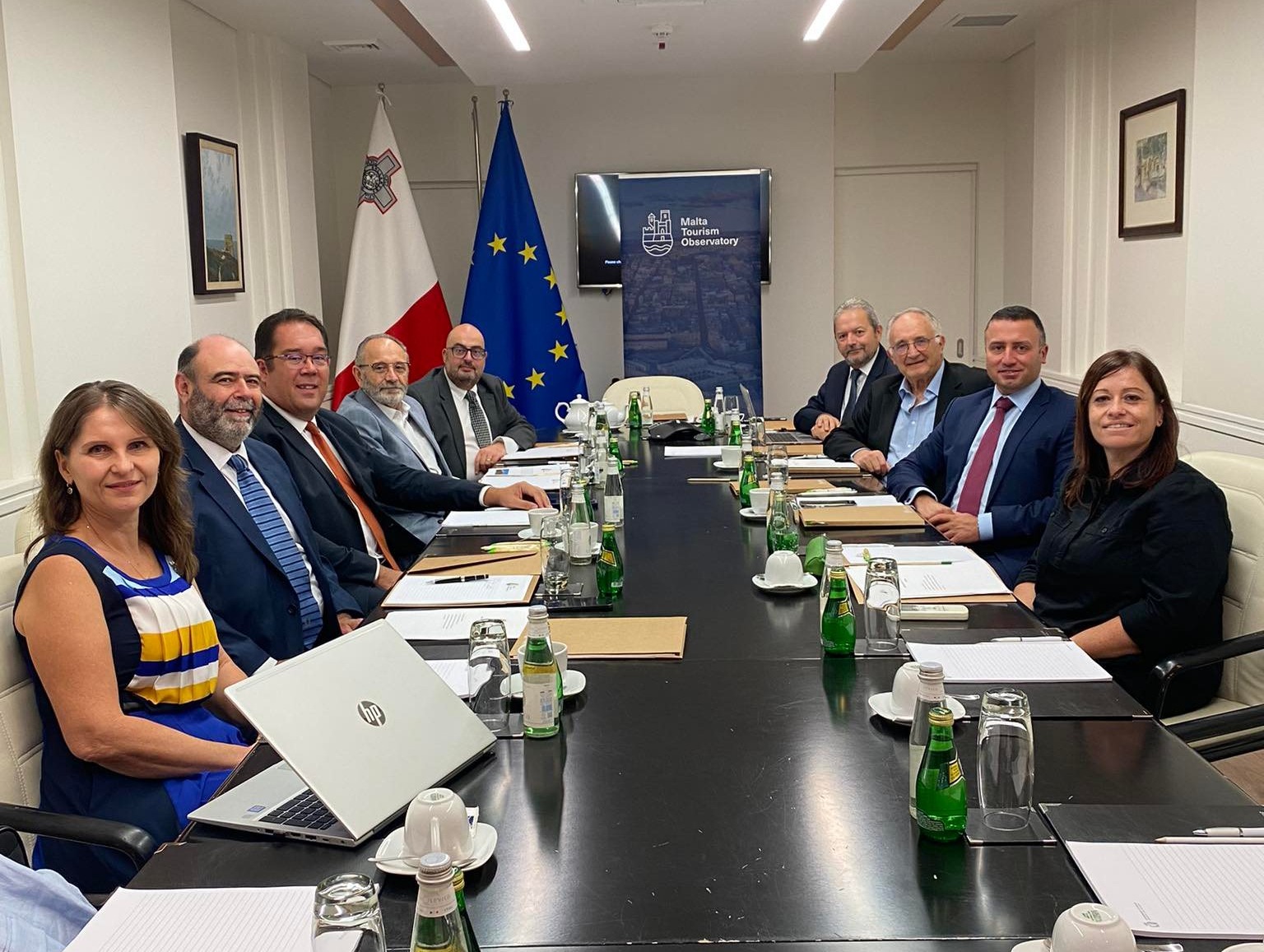
The Malta Tourism Observatory: Managing the future of the Maltese Tourism and Hospitality Industry
July 2, 2024

The Beauty of Branding in Interior Design
June 29, 2024
The Human Craving for Food
July 2, 2024The Malta Tourism Observatory (MTO) plays a pivotal role in the Maltese tourism and hospitality industry.
The Observatory was set up after the launch of the National Tourism Strategy 2030, to oversee the execution, the implementation of the strategy, and the delivery of the strategic objectives. Composed of ten tourism professional board members, chaired by MTA CEO Mr Carlo Micallef, the management board of the MTO is highly equipped to gather, analyse and disseminate data and insights about tourism activities in Malta.
The National Tourism Strategy 2030 was introduced post-pandemic to represent an initiative aimed at strengthening the local tourism industry to confront challenges and capitalise on upcoming opportunities. It has been founded on the principles of Recovering, Rethinking, and Revitalising, which collectively aim to restore tourism to its pre-pandemic level of economic activity while comprehensively reimagining Malta’s Strategic Approach to the industry. This would ultimately revitalise Malta’s approach for a stronger future. This strategy prioritises quality, sustainability, aligning visitor satisfaction with host population sentiment, efficient connectivity, accommodation development, industry HR issues, branding, and leveraging digitalisation. Notably, it emphasises the significance of Gozo as a distinctive stand-alone destination.
This comprehensive tourism strategy is the result of a meticulous analysis of the evolution of the local tourism industry over seven decades. It considers a wide array of international and domestic factors that are anticipated to influence Maltese tourism in the years ahead. The strategy is designed to incorporate evolutionary trends with sustainable scenarios, ensuring a long-term vision that seamlessly integrates with the country’s socio-economic needs across various attributes, including developmental, environmental, infrastructural, digital, social, traditional, gastronomical, and motivational aspects.
In this regard, the MTO has since been set up and tasked to encompass a variety of functions, all of which are crucial and have a significant impact on the tourism sector. The Observatory operates within the framework of the UNWTO’s International Network of Sustainable Tourism Observatories and fosters collaboration with relevant stakeholders, such as industry, academia, NGOs, and public entities, to ensure broad participation in the strategy’s execution and longevity.
Data Collection and Analysis
The primary focus of the MTO lies in gathering and analysing data pertaining to tourism activities within the Maltese region. Its core objective is to produce sustainable tourism indicators and insights. Using the collected data, the tourism observatory formulates a set of indicators designed to assess the economic, social, and environmental aspects of tourism within a specific area, aiming to offer a comprehensive understanding of tourism's impact on the region. One of the focal aims of the observatory is to evaluate the sustainability of tourism, which entails maximising its benefits while minimising negative impacts.
By scrutinising how tourism influences the environment, local communities, and the economy, the observatory aims to pinpoint areas for improvement. Subsequently, the observatory analyses the data and produces regular reports and publications that encompass trends, statistics, and insights, serving as valuable resources for various stakeholders, including government bodies, businesses, and non-governmental organisations. The data and indicators generated by a tourism observatory can inform policy decisions, enabling government agencies to develop and adjust policies related to tourism management, infrastructure development, and environmental conservation.
Destination Management and Development
Tourism observatories play a pivotal role in guiding the sustainable growth of destinations while mitigating adverse impacts. Through understanding visitor behaviours and preferences, destination managers, such as the Malta Tourism Authority, can make informed decisions regarding infrastructure development, land use planning, and environmental conservation. They can also implement visitor management strategies to preserve natural beauty and ensure positive visitor experiences. Furthermore, the observatory's data can influence decisions concerning transportation infrastructure, accommodation development, and the preservation of cultural heritage.
Visitor Satisfaction and Experience Enhancement
Enhancing the visitor experience is a primary objective for many destinations. Tourism observatories collect data on visitor satisfaction through surveys, online reviews, and feedback mechanisms, using this information to identify areas for improvement and develop strategies to enhance the overall experience. The observatory can recommend improvements in public transportation or better access to popular attractions based on the retrieved results, as well as highlight opportunities for cultural or culinary experiences that may be absent from a destination's offerings.

Marketing and Promotion
The data collected by tourism observatories serves as a valuable resource for marketing and promoting destinations. The Malta Tourism Authority can leverage these insights to create more effective marketing campaigns tailored to specific target markets, based on the interests and preferences of potential visitors. For instance, if a destination is increasingly popular among adventure travellers, marketing campaigns can focus on adventure-related activities, sports, and experiences. Similarly, if cultural tourism is on the rise, promotions can highlight museums, historical sites, and cultural events.
Crisis Management
Tourism observatories are instrumental during times of crisis, providing real-time data and insights to help destinations and businesses respond effectively to natural disasters, political instability, health emergencies, and economic downturns. Equipped with this information, destinations can adapt their strategies to minimise the impact of crises and plan for recovery.
Policy and Regulation
Data from tourism observatories often informs policies and regulations related to the tourism industry, aiding governments and local authorities in establishing rules for permitting, taxation, environmental protection, and visitor management. For instance, if data indicates overuse and environmental degradation at a particular attraction, policies may be implemented to limit daily visitors or introduce entry fees to fund conservation efforts. Similarly, tax policies may be adjusted based on economic impact assessments provided by the observatory.
Collaboration and Stakeholder Engagement
Effective tourism observatories foster collaboration among stakeholders in the tourism industry, bringing together government authorities, businesses, local communities, and non-governmental organisations to work toward common goals. By sharing data and insights, they help create a more integrated and sustainable tourism ecosystem. For example, if a destination is grappling with waste management challenges due to increased tourism, the observatory can facilitate discussions and collaboration between local businesses, environmental organisations, and local authorities to develop effective waste reduction strategies.
Sustainability and Responsible Tourism
Sustainability and responsible tourism are critical components of the modern tourism industry, and observatories help destinations monitor and manage their impact on the environment and local communities. Through analysing data on environmental footprints, social impacts, and cultural preservation, they can provide guidance on sustainable practices.
In conclusion, the comprehensive work of the MTO plays a vital role in the Maltese tourism industry. Through its data collection and analysis, it provides valuable insights on market trends, visitor behaviour, economic impact, and sustainability. The MTO supports destination management, enhances the visitor experience, informs marketing efforts, assists in crisis management, influences policies and regulations, promotes stakeholder collaboration, and drives sustainable practices. In a rapidly evolving industry, the tourism observatory is an indispensable tool for informed decision-making and the long-term success of Malta as a destination.
The Malta Tourism Authority (MTA) was formally set up by the Malta Travel and Tourism Service Act (1999). This clearly defines its role - extending it beyond that of international marketing to include a domestic, motivating, directional, co-ordinating and regulatory role. The Act strengthens the public and private partnership in tourism through greater and more direct participation by the private sector in national planning and development of the industry.
For more information visit https://www.mta.com.mt/
Click here to see Horeca Issue 16 online




